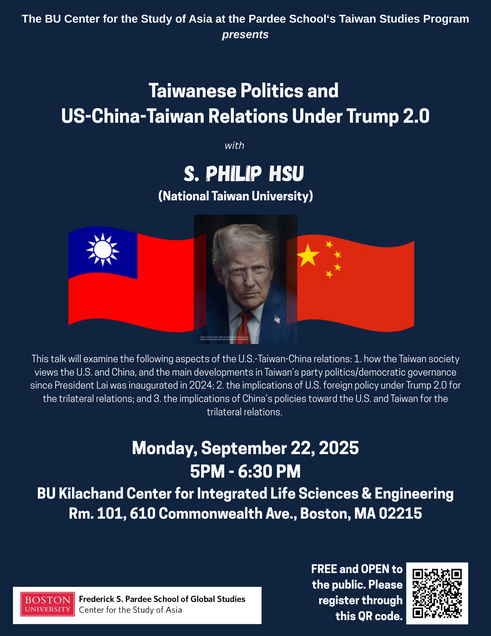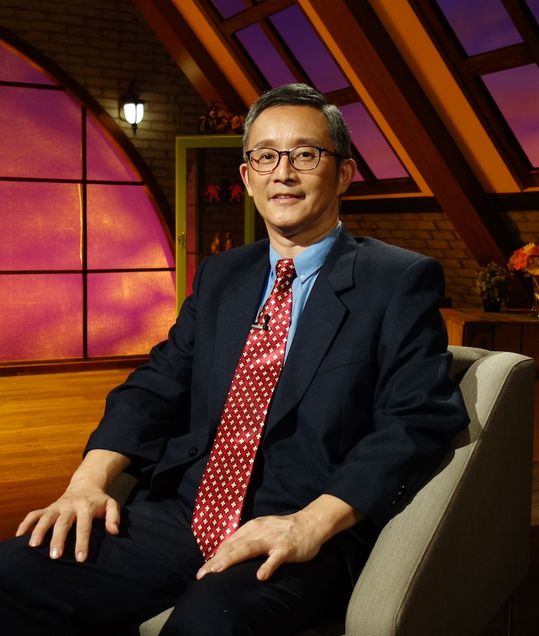9-22-2025 – Taiwanese Politics and US-China-Taiwan Relations Under Trump 2.0 with S. Philip Hsu
Monday, September 22, 2025
5PM – 6:30 PM
BU Kilachand Center for Integrated Life Sciences & Engineering
Rm. 101, 610 Commonwealth Ave., Boston, MA 02215
Event Report by
Maia Lane and Gracen Lashnits
(BU Pardee School Dean’s Ambassadors)
Philip Hsu holds dual appointments currently as Professor at the Department of Political Science and Professor at the School of Political Science and Economics at the National Taiwan University. In his presentation on Taiwanese Politics and US-China-Taiwan Relations Under Trump 2.0, his thorough knowledge and expertise of this matter is prevalent and insightful. Before talking about present day relations, Professor Hsu provides context for Taiwan’s relationship with China by delving into mounting cross-strait tensions between the two nations since 2024.
He emphasizes that the 2024 election of Taiwan’s new president, William Lai, essentially reiterated his predecessor President Tsai’s rhetoric, as Lai confirmed that the former was not subjugated to the latter. Professor Hsu then highlighted Beijing’s growing military pressures in response to Lai’s declaration; Beijing mounted both blockade simulations and missile tests. Despite this rise in tension, Taiwan has not yet announced de jure independence from China, and Professor Hsu states that this is among the primary reasons China hasn’t launched an immediate full-scale attack on Taiwan.
The lecturer also makes sure to note that the majority of Taiwanese citizens would opt to maintain the status quo rather than unification with China or de jure independence.
Against the background above, Taiwan’s executive branch is facing obstacles to carry out the ruling DPP’s policy initiatives, given the “political gridlock” since the 2024 elections. The Democratic Progressive Party (DPP) came out victorious in the presidential election, however thT-TPP coalition prevailed in the election for the Legislative Yuan, seizing the parliamentary majority. Under this gridlock, the coalition forze freezing over 20 billion dollars in budget cuts without consulting agencies. The coalition argues that these cuts are intended to keep the executive power in check, but the cuts also weaken central government and defense capacity.
The political divide in Taiwan deepened this past summer with a grand recall election targeting 31 KMT members in the parliament. Though this recall was launched by a civilian group, it was heavily supported by President Lai and DPP as a whole. He launched a speaking tour around the island and pushed rhetoric that the recall elections were to protect Taiwan from KMT members corrupted by Beijing. Some KMT members had indeed met with Chinese leaders in charge of ideational infiltration toward Taiwan. The defense budget cuts passed by the coalition was seen by many as weakening defense. However, the DPP faced a heavy blow after the two rounds of recall ended in August when no KMT members were recalled.
Many Western countries believe the failed grand recall points towards a shift in Taiwanese opinion towards China. However, Professor Hsu explained that the result had to do with internal politics. Many Taiwanese saw the grand recall as excess political rivalry. The vote failed also because the people of Taiwan believe that fair and competitive elections are the most crucial pillar of Taiwan’s democracy and that recalls would defy the significance of election results. Polls show that public opinion in Taiwan had not turned more friendly towards China around the time of the recall.
Professor Hsu then shifted to discuss Taiwan in the context of China’s domestic and foreign policy. In Chinese domestic politics, Xi Jinping is most likely going to run for a fourth term. However, Xi is facing uncertainties about maintaining control of the People’s Liberation Army (PLA). 22/79 of the generals Xi appointed have been purged in the past year, undermining China’s combat readiness. Despite a weakened military, however, Xi may consider taking Taiwan to keep his promise to the Chinese citizens of reuniting China and Taiwan. According to Professor Hsu, an invasion of Taiwan would be more likely to come through a blockade or cutting underwater internet cables rather than an all-out attack.
The Trump administration is not helping deescalate the current atmosphere. A recent poll revealed 78% of Taiwanese distrust Trump. Many are afraid that the U.S. could hollow out the semiconductor industry from Taiwan. On the other side, China is refusing to accept the heavy tariffsimposed by Trump and bargaining hard with Washington. Trump is also continuing the American policy of undetermined status of Taiwan, which could potentially fuel China to make a move.
In conclusion, the Taiwanese situation under the Trump administration and changing international field is ever evolving. Domestically, most Taiwanese, especially the youth, feel they have a distinct identity separate from China. However, most support maintaining the status quo and preserving their democracy. With Trump and Xi Jinping’s uncertain policies in the future, Taiwan will have to find a way to balance both while maintaining their status.

The talk will examine the following aspects of the U.S.-Taiwan-China relations: 1. how the Taiwan society views the U.S. and China, and the main developments in Taiwan’s party politics/democratic governance since President Lai was inaugurated in 2024; 2. the implications of U.S. foreign policy under Trump 2.0 for the trilateral relations; and 3. the implications of China’s policies toward the U.S. and Taiwan for the trilateral relations.
 Philip Hsu holds dual appointments currently as Professor at the Department of Political Science and Professor at the School of Political Science and Economics, National Taiwan University. He is also Executive Director of Center for China Studies, College of Social Sciences, NTU. During July 2022~January 2023, he was a visiting fellow at the Center for East Asia Policy Studies of Brookings Institution, and a Fulbright scholar. He was president of the Chinese Association of Political Science (Taipei), and is now on the supervisory boards of the Chinese Association of Political Science (Taipei) and the R.O.C. Association of International Relations. He obtained his doctoral degree from the Josef Korbel School of International Studies, University of Denver, USA. He was on the Advisory Committee under the Sea Exchange Foundation, and the Advisory Committee under Mainland Affairs Council, Executive Yuan, Taiwan. Professor Hsu’s research interests include comparative politics (with particular emphasis on the People’s Republic of China), political economy, and international relations (with particular emphasis on Asia-Pacific international security and economic cooperation). His articles have been published in The Pacific Review, Australian Journal of Public Administration, Journal of Contemporary China, Cambridge Review of International Affairs, Issues & Studies, Journal of Chinese Governance, etc. He is also a co-editor of twelve edited volumes published in Taiwan, China, and the English-speaking world, such as In Search of China’s Development Model: Beyond the Beijing Consensus (co-edited with Yu-Shan Wu and Suisheng Zhao) (New York: Routledge, 2011), and Minzhu, Minzhuhua, and Zhili Jixiao (Democracy, Democratization and Governance Performance) (with Yu Xunda)(Hangzhou, China: Zhejiang University Press, 2011).
Philip Hsu holds dual appointments currently as Professor at the Department of Political Science and Professor at the School of Political Science and Economics, National Taiwan University. He is also Executive Director of Center for China Studies, College of Social Sciences, NTU. During July 2022~January 2023, he was a visiting fellow at the Center for East Asia Policy Studies of Brookings Institution, and a Fulbright scholar. He was president of the Chinese Association of Political Science (Taipei), and is now on the supervisory boards of the Chinese Association of Political Science (Taipei) and the R.O.C. Association of International Relations. He obtained his doctoral degree from the Josef Korbel School of International Studies, University of Denver, USA. He was on the Advisory Committee under the Sea Exchange Foundation, and the Advisory Committee under Mainland Affairs Council, Executive Yuan, Taiwan. Professor Hsu’s research interests include comparative politics (with particular emphasis on the People’s Republic of China), political economy, and international relations (with particular emphasis on Asia-Pacific international security and economic cooperation). His articles have been published in The Pacific Review, Australian Journal of Public Administration, Journal of Contemporary China, Cambridge Review of International Affairs, Issues & Studies, Journal of Chinese Governance, etc. He is also a co-editor of twelve edited volumes published in Taiwan, China, and the English-speaking world, such as In Search of China’s Development Model: Beyond the Beijing Consensus (co-edited with Yu-Shan Wu and Suisheng Zhao) (New York: Routledge, 2011), and Minzhu, Minzhuhua, and Zhili Jixiao (Democracy, Democratization and Governance Performance) (with Yu Xunda)(Hangzhou, China: Zhejiang University Press, 2011).